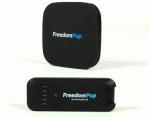
It’s been nearly a year since a company called FreedomPop announced its intentions (though a cryptically ambitious press release, no less) that it planned to bring “free broadband” to data-hungry users nationwide. The early FreedomPop site didn’t inspire much confidence, but it wasn’t long before the team’s practical vision came to light.
Put simply, users would get 500MB of free 4G wireless data each month, and a neat social layer would let those users trade data like the commodity FreedomPop thinks it should be. Now FreedomPop is taking another big step forward — the company has just launched its public beta, allowing users to take the nascent freemium internet service for a spin.
First things first: remember those neat WiMax-enabled iPhone and iPod touch cases? The ones that promised to set users free from the clutches of more traditional (some would say greedy) wireless carriers? Well, for better or worse, they’re not available as part of the public beta just yet — according to FreedomPop COO Stephen Sesar, those so-called Freedom Sleeves are currently four to six weeks away from their official debut. For the time being, early FreedomPop adopters will be able to choose from one of two gadgets — the Photon wireless hotspot and the Bolt USB modem. Expect to plunk down security deposits of $89 and $49 for the Photon and Bolt, respectively.
Yes, that’s right, deposits. A trusted source inside FreedomPop told TechCrunch last May that the company had given up the deposit model because of the accounting headaches it would induce, but FreedomPop has apparently come full-circle on the idea in an attempt to keep things “as free as possible.” Interestingly enough, the iPhone and iPod won’t require deposits — that same source revealed that the company has locked up key retail deals for them and therefore have to sell in them order to avoid “channel conflict.”
In the event that free 500MB just isn’t enough and you don’t have any friends to spot you some bandwidth for the month, the company offers prepaid data plans starting at $10/month for 1GB of WiMax data. FreedomPop’s pricing matrix doesn’t end there though — consumers will also have access to a 5GB/month plan for $35, and the truly data-hungry can get set up with 10GB of monthly WiMax data for $59.99 should they really need it.
Naturally, just because FreedomPop has opened its doors to the public doesn’t mean that the company is suddenly ready to spill the beans on everything. One of the biggest service components that FreedomPop is still being cagey about is its slew of premium features, which Sesar expects to be a critical revenue driver for the young company as it gives away free data to the masses. All in all, the company tested nearly 114 potential value-added features that ran the gamut from security to data backups. In the end only three or four of them have been deemed appropriate and useful enough to the service’s potential users.
FreedomPop Marketing VP Tony Miller hinted to GigaOM back in July that one of those services would allow users to make voice calls over the network (further blurring the line between FreedomPop and any other wireless carrier), but Sesar wouldn’t confirm that was the case. What users can do though is pay an additional $2.99/month to pump up their data speeds, as well as complete certain tasks courtesy of FreedomPop’s partners (think watching ads and the like) in exchange for more monthly data.
If that particular angle sounds familiar, then congratulations — you lived through the 90s. Companies like NetZero offered free dial-up back in the day in exchange for plastering ads everywhere, and COO Sesar himself was quick to point out the parallels between FreedomPop and the free ISPs of days past. (As it turns out, NetZero is still at it and offers free wireless broadband as well. Go figure.) Can a modern twist on an old concept really disrupt the wireless industry? Only time will tell, but with freemium products like Dropbox and Evernote continuing to pick up traction, it seems that FreedomPop just may be the right service at the right time.


